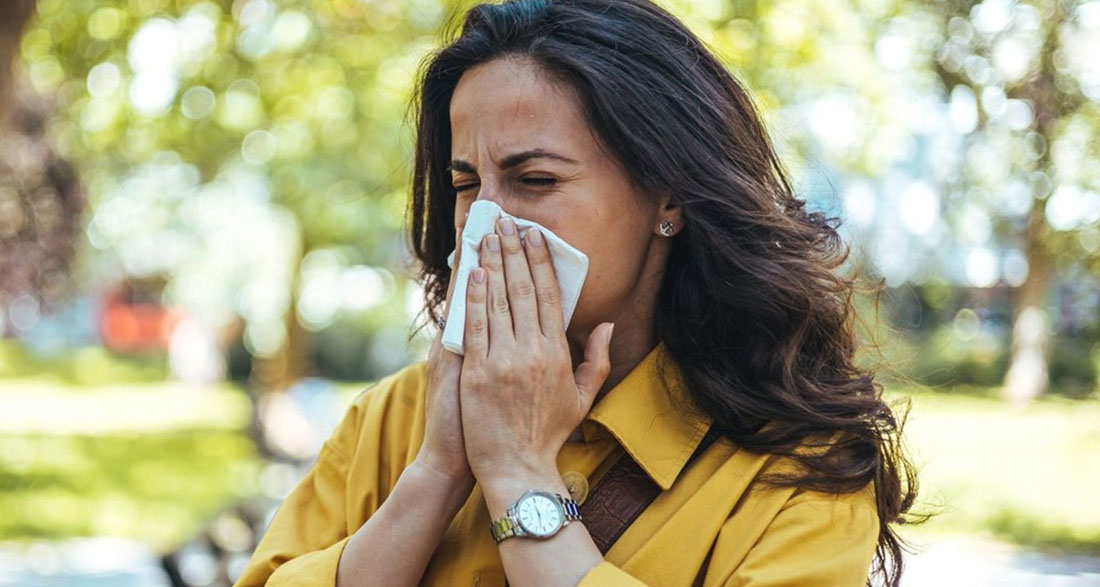Itchy eyes, a runny nose, constant sneezing – spring is no joy for allergy sufferers. These home remedies help you get through pollen season.
The first warm rays of sunshine, blooming crocuses, and buzzing bees – spring slowly awakens nature to life. But for many people, this also marks the start of sneezing, sniffing, and rubbing their eyes. Around 15% of Germans suffer from hay fever. Their tiny, invisible, and omnipresent opponents? Pollen. These float through the air, settle on skin and clothing, and creep into noses and eyes. However, prescription medications from the pharmacy are not always necessary to get rid of the annoying symptoms. Some home remedies can also help.
Essential Oils Relieve Symptoms
Essential oils, such as eucalyptus and peppermint oil, can be helpful in the fight against pollen allergies. Eucalyptus acts similarly to cortisone and can alleviate symptoms—for example, as an additive in bathwater. Mixed with edible oil, eucalyptus oil can also be used as nasal drops to clear the airways. Peppermint oil can stop sneezing attacks—just massage a few drops onto your temples.
Homemade Nettle Tea
Nettle tea can be a gentle natural remedy for hay fever, as it has a decongestant effect. You can find nettle leaves in your garden or along pathways in nature, then dry them. Pour hot water over the dried nettle leaves and let them steep for five to ten minutes. If the taste is too strong, add some lemon juice or honey. Honey also has anti-inflammatory properties and can even relieve pain.
Treating Rashes with Herbs
While herbs are often the culprits behind hay fever, some can help against rashes that commonly accompany allergies. Balloon vine, which is frequently found in skin creams, is particularly effective. Horsetail is also good for treating stubborn rashes, such as when added to bathwater.
Eyebright herb is aptly named—it works wonders for inflamed, watery eyes. You can drink a cup of eyebright tea or let it cool and then dab it onto your eyes with a cotton pad. If you suffer from severe eye itching, avoid rubbing your eyes at all costs. Instead, dampen a cloth with cold water and place it on the itchy areas for several minutes.
Apple Cider Vinegar: A Miracle Cure
Apple cider vinegar has anti-inflammatory properties. If you only experience mild symptoms, drinking a glass of water with two tablespoons of apple cider vinegar per day can help. To make it more palatable, simply add a little honey. If symptoms are more severe, you can drink this mixture up to three times a day.
The Classic Nasal Rinse
The good old nasal rinse can help remove pollen from the nasal mucosa. To do this, fill a neti pot or nasal rinse bottle with lukewarm water and a pinch of sea salt. Then, rinse your nose with the solution. For acute symptoms, use a nasal rinse every evening. However, be cautious—overuse can irritate the nasal lining.
Hygiene and Healthy Food Choices
Hygiene is crucial for hay fever sufferers. When coming inside from outdoors, it’s essential to change clothes, wash hands, or, ideally, take a shower. This removes pollen and prevents inhaling it overnight.
A healthy diet can also help alleviate pollen allergy symptoms. Allergy sufferers should avoid processed foods, smoked fish, sausage, aged cheese, ready-made meals, chocolate, nuts, and soy products. Fruits like strawberries, pineapples, pears, and oranges should also be avoided.
Instead, opt for ginger, which inhibits histamine release and alleviates symptoms. Ginger also strengthens the immune system and boosts metabolism. Turmeric, a close relative of ginger, is also believed to have healing properties—it additionally enhances the body’s defenses.






